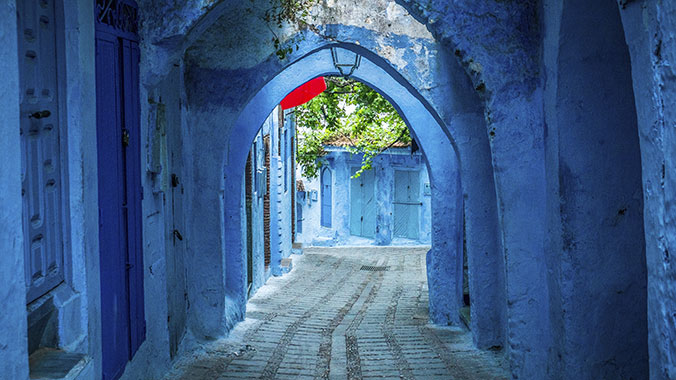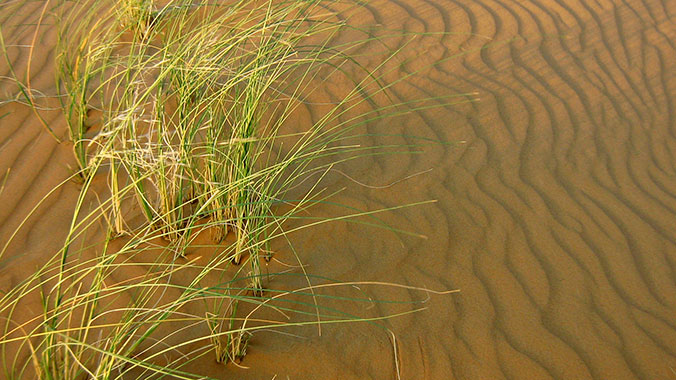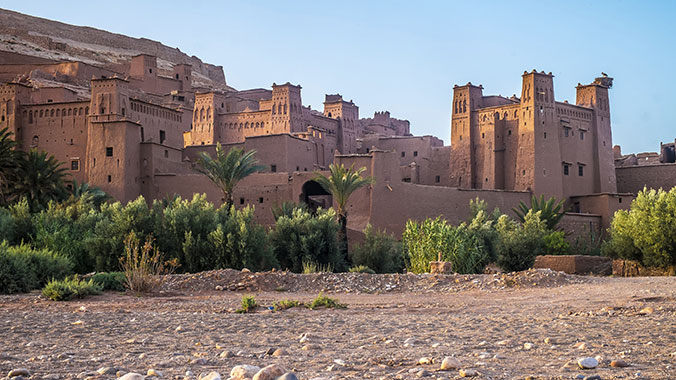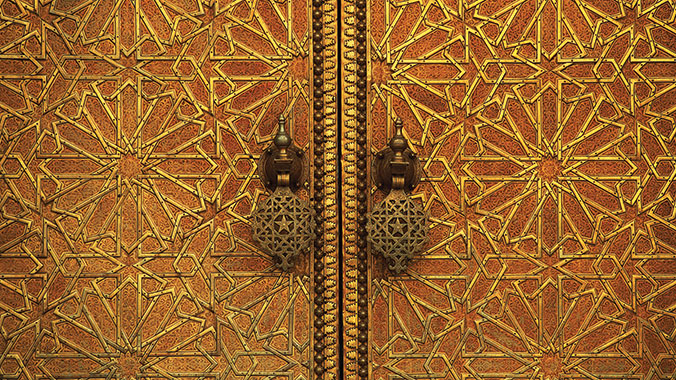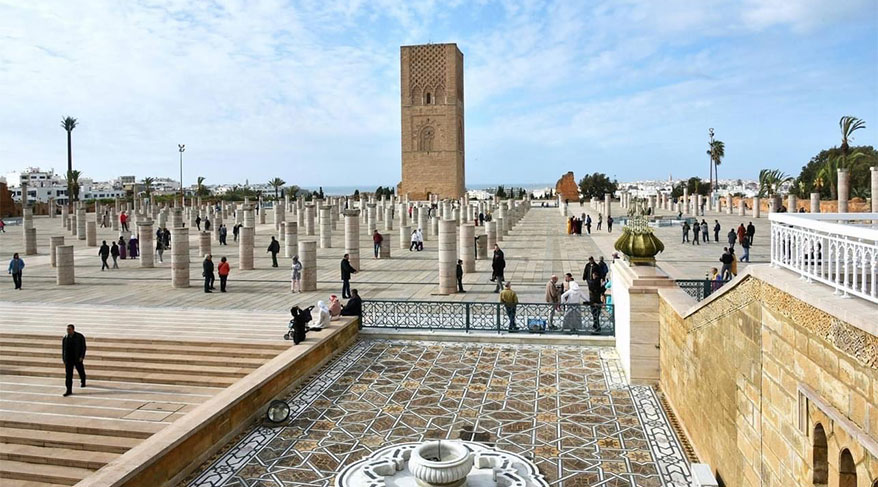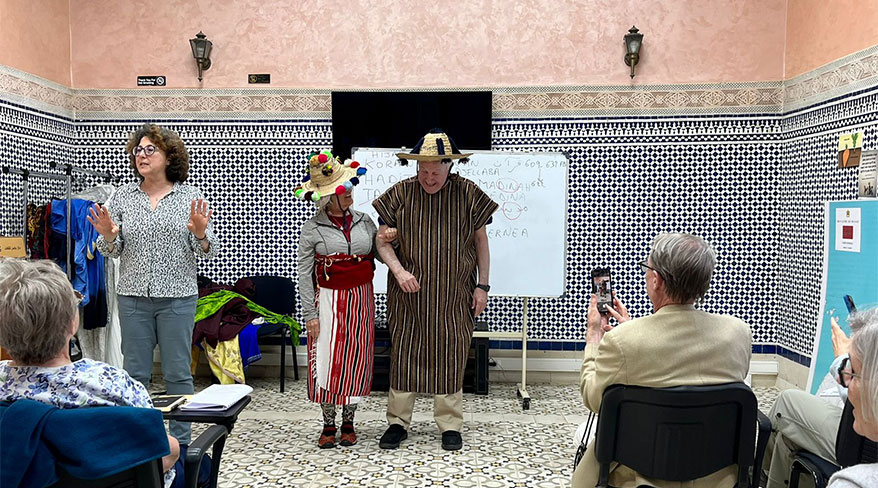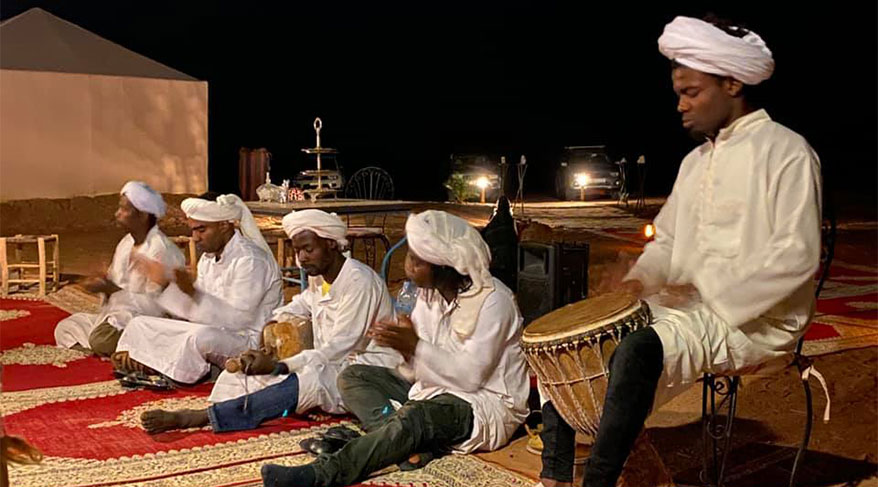Morocco
Morocco: Melting Pot of Cultures
Program No. 7158RJ
Discover the vibrant culture of Morocco as you get hands on with cooking classes, meet local artists, explore stunning landscapes and learn the complex story of this ancient land.
Itinerary
While we make every effort to ensure the accuracy of our published materials, programs are typically advertised more than a year prior to their start date.
Read More.
While we make every effort to ensure the accuracy of our published materials, programs are typically advertised more than a year prior to their start date. As a result, some program activities, schedules, accommodations, personnel, and other logistics occasionally change due to local conditions or circumstances. Should a major change occur, we will make every effort to alert you. For less significant changes, we will update you during orientation. Thank you for your understanding.
Duration
18 days
17 nights
What's Included
42 meals (
16B, 14L, 12D
)
20 expert-led lectures
16 expert-led field trips
4 performances
An experienced Group Leader
16 nights of accommodations
Taxes and customary gratuity
Road Scholar Assurance Plan
Day
1
In Transit to Program
Location:
In Flight
Day
2
Welcome and Introduction to Morocco
Location:
Rabat
Meals:
D
Stay:
ONOMO Hotel Rabat Terminus
Afternoon:
Arrival to Rabat Sale Airport and Meet the group leader. Check in at the hotel Orientation Session: Overview of the daily shedule Lecture: Introduction to Morocco
Dinner:
Dinner at Center for Cross Cultural Learnig
Evening:
Bus leaves for the Hotel
Day
3
Landmarks, Moroccan Politics, and Music
Location:
Rabat
Meals:
B,L,D
Stay:
ONOMO Hotel Rabat Terminus
Activity Note
All the lectures are going to be in a conference room with air-conditioning, the lectures last for about 1:30. The tour of Rabat is combines riding and walking.
Breakfast:
Breakfast at the hotel
Morning:
Field Trip: “Daily Life in Rabat and the Land Marks of the City”,
Lunch:
Lunch in Riad (restaurant in a Moroccan style architecture)
Afternoon:
- Visit the Modern Art Museum of Mohamed VI - Lecture: Moroccan Politics
Dinner:
Dinner at the Center
Evening:
Musical Performance: Andalusian Music Musical performance prepared for this with readings of Arabic poetry reflecting the Andalusian heritage in Morocco
Day
4
Islam, Women & Cultural Diversity
Location:
Rabat
Meals:
B,L
Stay:
ONOMO Hotel Rabat Terminus
Activity Note
All the lectures are going to be in a conference room with air-conditioning, the lecture last for about 1:30 with a break of 30 minutes coffee break in panoramic terrace overlooking the medinas of Rabat & Salé, as well as the Atlantic Ocean.
Breakfast:
Breakfast at the Hotel
Morning:
Lecture 1: Islam in Morocco: Islam in Morocco is an attempt to give an insight view of how Muslims from this part of the world see themselves and how they answer questions related to their religion, their daily life, social, cultural and religious day to day duties and responsibilities. The session aims at shedding light on certain aspects of how religious texts, social norms and cultural values in the case of Morocco deal with Muslims lives from past to present and how do Muslims look at the future of a global Islam. Lecture 2: Women, veil in Islam and Moroccan costumes. The Veil in Islam has always been intriguing to both Muslims and non-Muslims. One finds a wide diversity in the definitions of the veil and its religious and social significance. This lecture aims at helping us understand this diversity and provides the social, historical, and religious contexts of the veil in Islam, a veil that has appeared to be oppressive to some and empowering to others. Outfits from around Morocco, rural and urban, including head covers will be presented to shed light about the tribal and contemporary meanings of the dress. While men’s and women’s costumes will be displayed, the focus of this session is to link the legal, religious and traditional challenges and opportunities facing women today in Morocco
Lunch:
Lunch with the group
Afternoon:
Free afternoon
Dinner:
Dinner on your own
Day
5
International and mythical Tangier
Location:
Tangier
Meals:
B,L,D
Stay:
Barceló Tanger
Activity Note
This morning's field trip will require walking, as well as getting on and off bus multiple times
Breakfast:
Breakfast at the hotel
Morning:
Departure to Tangier Via Assila Field trip: The Murals of Asilah
Lunch:
Lunch with the group
Afternoon:
Resume trip for Tangier Field Trip: Cap Spartel and the Caves of Hercules. Arrive to Tangier, Check in, free time until dinner
Dinner:
Dinner in an international restaurant
Day
6
Arts, architecture & Mediterranean cultures Northen issues
Location:
Chefchaouen
Meals:
B,L,D
Stay:
Riad Darechchaouen
Activity Note
This morning's field trip will require extensive walking. In the afternoon bus ride to Chefchaouen.
Breakfast:
Breakfast at the hotel
Morning:
Field Trip: International and Multicultural Tangier. We will ride the bus for part of the trip and walk through place du 9 avril, Souk Dakhel. A local expert will help us explore the different historical epochs of this millennium city. A walk in the famous Boulevard to see various types of architectures, the synagogue, the international Tangier where French, Italian, Andalusian, Moorish, and Modern architecture are melting to lead us to the old Menzah hotel as we enter the Medina of Tangier built on a Roman Forum. As we head to lunch, we will learn about the today daily life in Tangier passing by landmarks of the city, Palaces, Punic-Roman Necropolis of Hafa, and the Kasbah where international artists have left their footprints
Lunch:
Lunch at a restaurant on the strait of Gibraltar
Afternoon:
Continue the drive to Chefchouen Bus lecture: Issues and Opportunities in Northern Morocco that will cover Drug Plantation and Business, and Illegal Migration
Dinner:
Dinner with group
Day
7
Chefchaouen: The Blue Pearl City From 1471
Location:
Chefchaouen
Meals:
B,L
Stay:
Riad Darechchaouen
Activity Note
The city of Chefchaouen is located on hills. The field trip through the town is 3 hours with 20 min stops at the different sites. Rocky and slippery streets and paths, deep stairs that need mindful attention with how you move your feet.
Breakfast:
Breakfast at the hotel
Morning:
Guided visit of the Medina Explore the town of Chefchaouen which is famous for its blue-rinsed houses and buildings,it offers many native handicrafts such as wool garments and woven blankets. Visit of the fifteenth century Kasbah and its musuem.
Lunch:
Lunch at the Local restaurant
Afternoon:
Open forum: Discussion between the Group leader and the particpants about topics of interest, including Q&A
Dinner:
Dinner on your own
Day
8
Sufism in Morocco & Moroccan gastronom
Location:
Fes
Meals:
B,L,D
Stay:
Hotel Merinides
Activity Note
The drive between Chefchaouen & Ouazzane is 1.30 hours. The drive between Ouazzane and Fes is 2:00 hours rest stops are included. In Ouazzane, expect hilly, rocky and slippery streets and paths, uneven stairs that need mindful attention with how you move your feet. We might arrange a ride to the private home where lunch & lecture will take place for those with speacial needs.
Breakfast:
Breakfast at the hotel
Morning:
Bus leaves Chefchaouen for Fes via Ouazzane. Ouezzane is a small city located in the edges of the Rif mountains. It was a village before the 17th century, and became with its founder, Moulay Abdallah Cherif, a spiritual center in the country with several annexes in different regions of the Maghreb, Egypt, Saudi Arabia, Greece, Turkey and India. Ouazzane is an unwalled holy city that has attracted a Moroccan Jewish population early 18th century. Moulay Abdallah Cherif was a spiritual Sufi Master, and his descendants played important political and social roles in the country up till the 19th century. Some of them established strong relations with the Europeans and moved out of the town. This field trip will take us around the medina, we will visit the souk where the wool djellabas are made, and get to a private home for an exquisite organic traditional Ouazzani lunch. In the private home, discussion about the Moroccan gastronomy, specificities of the Ouazzani cuisine and the use of herbs and olive oil traditional
Lunch:
Lunch with the group in a private house in Ouazzane
Afternoon:
Musical Performance: “Sufi chanting” Resume the trip to Fes Bus lecture: “Farming and Agriculture” Check in at the hotel
Dinner:
Dinner at the hotel
Day
9
9th cent labyrinth medina and 14th cent Jewish quarter
Location:
Fes
Meals:
B,L,D
Stay:
Hotel Merinides
Activity Note
The field trips through Fes are divided in 3 part 2hours each. Walking through crowded & narrow streets, filled with vendors, shoppers, and heavy foot and animal traffics. lunch, monument visits and rest stops are embedded during the day. Participants can be transferred back to the hotel at any point during the field trip if desired.
Breakfast:
Breakfast at the hotel
Morning:
Guided Visit: Past and present in the old Medina of Fes Local guides of the city of Fes will accompany the group through the narrow streets and alleys of Fes. Our senses will be challenged through the smells, sights and the sounds of the oldest Islamic city of Morocco. Fes displays its beauty to the visitors through its Arab and Islamic architecture. We will explore different monuments such as the Medersa, the Foundouq museum, the tanneries, and will walk by the mausoleum where the founder of the first Islamic dynasty is buried, as well as by the Qaraouyine Mosque & university built by a woman in the 9th century
Lunch:
Lunch in the heart of the medina in a local Moroccan restaurant.
Afternoon:
Resume the visit of Fes. Talk to the craftsme, and women. Hands-on with the cactus silk weavers (Sabra), and visit the pottery village outside the walls of the medina. Coach back to the hotel followed by free time.
Dinner:
Dinner with the group
Day
10
Roman Heritage of Morocco
Location:
Fes
Meals:
B,L
Stay:
Hotel Merinides
Activity Note
The visit to Volubilis ruins is two hours in length. Expect rough terrain in the archeological site; we will walk in a steady pace. The bus will be parked within a 15 minute walking distance from the site and participants can return to it at any time. In Meknes we will visit the music museum located in a 19th Century private home.
Breakfast:
Breakfast at the hotel
Morning:
Bus leaves for Volubilis Bus lecture: Educational System in Morocco Guided Visit: The Roman Ruins of Volubilis. Designated a UNESCO World Heritage Site in 1997, Volubilis features the best preserved Roman Ruins in North Africa. Archaeological evidence suggests initial settlement occurring in 40 AD upon a pre-existing Carthaginian site dating back to 3rd century BC. Eventually, Volubilis emerged as the administrative center in Roman Africa until an earthquake compelled its residents to abandon the city in the late 4th century AD. Since 2000, archaeological excavations have been carried out by the Moroccan National Institute of Sciences of'archeogy and Patrimony.
Lunch:
Lunch at a local restaurant
Afternoon:
Visit of the Musical Museum located in a 19th Century private home
Dinner:
Dinner on your own
Day
11
Scenery of Middle & High Atlas Mountains: Amazigh culture
Location:
Erfoud
Meals:
B,L,D
Stay:
Chergui Kasbah Hotel
Activity Note
Long bus ride through the Atlas Mountains with several stops
Breakfast:
Breakfast at hotel
Morning:
Bus leaves to Erfoud via Errachidia Bus Lecture: Amazighi (Berber) Issues
Lunch:
Lunch at a local restaurant
Afternoon:
Resume trip to Erfoud Bus Lecture: Nomads and semi-Nomads Check in Hotel Chergui Orientation to the Desert Experience
Dinner:
Dinner at the Hotel
Evening:
Live Musical Performance: Malhoun, Jorf & Beldi. “Malhoun is a melody, an old genre of oral popular urban poetry written in Moroccan Arabic that would cover different themes such as love, feminine beauty, glory and mysticism.” Performance exlusive to our groups
Day
12
Kindergarten/Primary school visit Sunset on Merzouga dunes
Location:
Merzouga
Meals:
B,L,D
Stay:
Nomadic Tents
Activity Note
Walking in the market & the old section of Rissani at a slow pace. Walk in the Hassi Labiad Oasis through the millenary irrigation system at a regular pace Ride the 4-wheel-drive vehicles. for 1/2 hour to the Merzouga desert camp Camel ride on the dunes to watch the sunset (not recommended for people with balance issues) Spend the night under tents (with king size real beds & private bathroom)
Breakfast:
Breakfast at the hotel
Morning:
Bus leaves for Rissani Field Trip Rissani: Daily activities. Visit an exceptional public Kindergarten/Primary school & have a discussion with the managers about related current issues. Field Trip: Ksour of Tafilalt, Lecture; Architecture in the Desert
Lunch:
Lunch at a local restaurant- Rissani
Afternoon:
Field Trip: Hassi Labiad Oasis. Walk through the irrigation systems in the desert with a local expert. Board 4-wheel drive vehicles for excursion to the dunes of Merzouga. Take a camel ride to the top of the dunes to enjoy the sunset.
Dinner:
Dinner in the tent camp
Evening:
Musical Performance: Gnawa of Khamlia, a Sub-Saharan Moroccan music and dance that fuses classical Islamic Sufism with pre-Islamic traditions from the indigenous Amazighi culture, and an ethnic group/religious order partly descended from former enslaved people. Gnawa art is characterized by deep low toned sinter melodies, call and response singing, hand clapping and cymbals, as well as drumming. It strives to evoke a deep hypnotic trance, often aimed at frightening off evil spirits.
Day
13
Desert sunrise Striking topoghraphy breathtaking landscape
Location:
Ouarzazate
Meals:
B,L,D
Stay:
Ibis Ouarzazate Centre
Activity Note
Ride the 4-wheel drive vehicles back Long bus ride to Ouarzazate the whole day with several stops
Breakfast:
Breakfast at the hotel
Morning:
Take 4- wheel drive to Erfoud Bus leaves to Ouarzazate via Tinjdad and Tinghir Enjoy the landscapes while tie the learning experiences of the desert
Lunch:
Lunch at a local restaurant
Afternoon:
Bus lecture: Human rights violations and Truth and Reconciliation process in Morocco Resume trip to Ouarzazate Bus lecture: Western Sahara. Then, drive through the Road of 1000 Kasbahs and stop at Kalaa M'Gouna (The Roses Valley). Check in at the Hotel
Dinner:
Dinner at the Hotel
Day
14
Tizi n Tichka 7200 ft in the High Atlas Mountain
Location:
Marrakech
Meals:
B,L,D
Stay:
Kenzi Rose Garden
Activity Note
The drive to Marrakech will cross the High Atlas Mountains by Tizi n Tichka pass at an elevation of 7,200 ft. The road winds up tight turns along the mountains. Long ride with several stops
Breakfast:
Breakfast at the hotel
Morning:
Guided Visit to Kasbah Glaoui, palace of the last ruling family of southern Morocco. Depart for Marrakech Bus Lecture: Hollywood of Morocco Resume trip to Marrakech
Lunch:
Lunch at a local restaurant in the highest pass in Morocco.
Afternoon:
Resume trip to Marrakech Bus lecture: Family farming and women daily life in
Dinner:
Dinner at the hotel
Day
15
Bahia Palace Majorelle Garden Berber Museum Jamaa Lfna sq.
Location:
Marrakech
Meals:
B
Stay:
Kenzi Rose Garden
Activity Note
Walking in crowded busy medina of Marrakech, a compact walkable city
Breakfast:
Breakfast at the hotel
Morning:
Field trip: Historical Marrakech. Known as the Red City and an important former imperial capital, it lies at the foothills of the snow-capped Atlas Mountains. Marrakech has the largest traditional market in Morocco and one of the busiest squares in the world, Jamaa Lfna. Jamaa Lfna, the UNESCO heritage world-renowned city square known for its snake charmers, musicians, dancers, acrobats, fortune tellers, and popular street theater, as well as food stands and shops of many kinds. We’ll see significant historical monuments and sites of Marrakech and hear stories of the people for whom they were built: Bahya Palace, the Koutoubia mosque, the Berber museum in the Majorelles Garden
Lunch:
Lunch on your own
Afternoon:
Free time in Jamaa Lafna, the Open Outdoor Theatre
Dinner:
Dinner on your own
Day
16
A day with Women of the high Atlas Mountains
Location:
Marrakech
Meals:
B,L,D
Stay:
Kenzi Rose Garden
Activity Note
Slow pace day
Breakfast:
Breakfast at the hotel
Morning:
Departure to the village Tea and open group discussion with the women villagers
Lunch:
Lunch with the group
Afternoon:
Departure for Marrakech
Dinner:
Farewell dinner
Day
17
Hassan IInd Mosque guided visit
Location:
Casablanca
Meals:
B,L,D
Stay:
Novotel Casablanca City Center
Activity Note
Half day on the bus Short walk to the mosque from the bus Possibility of ride for the people with walking difficulties
Breakfast:
Breakfast at the hotel
Morning:
Bus leaves for Casablanca Bus lecture: Modern Higher education in Morocco (Benguerir) Bus lecture: Morocccan development and economy.
Lunch:
Lunch at a local restaurant- Casablanca
Afternoon:
Guided visit of Casablanca (Hassan IInd Mosque) Questions and Answers Program Wrap-up session
Dinner:
Dinner with the group
Day
18
Program Concludes
Location:
Casablanca
Meals:
B
Breakfast:
Early breakfast
Morning:
Depart for Mohamed V airport
Please select a day to update the map
Map details are not available for this location.

